Ardyth DeBruyn's Blog, page 11
January 13, 2012
MIDNIGHT OIL Book 2 of the Witches of Galdorheim Series
One of my writing partners has a new book that just came out and I'm really excited to be in her blog tour! Bad Spelling, the first book in the series, just placed 2nd in the Preditor/Editor Readers Poll in Childrens Novels. Book three will be coming soon. This is a fabulous series and I'm thrilled to be able to host a excerpt from "Midnight Oil." Check it out for a chance to win the book and help support a great author.
***
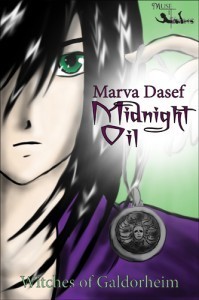 Shipwrecked on a legendary island, how can a witch rescue her boyfriend if she can't even phone home?
Shipwrecked on a legendary island, how can a witch rescue her boyfriend if she can't even phone home?
Bio: Marva Dasef is a writer living in the Pacific Northwest with her husband and a fat white cat. Retired from thirty-five years in the software industry, she has now turned her energies to writing fiction and finds it a much more satisfying occupation. Marva has published more than forty stories in a number of on-line and print magazines, with several included in Best of anthologies. She has several already published books and the Witches of Galdorheim Series from her super duper publisher, MuseItUp.
Marva Dasef http://marvadasef.com
Blog: http://mgddasef.blogspot.com
MuseItUp Author Page: http://tinyurl.com/MIU-MarvaDasef
Facebook: http://www.facebook.com/home.php?#!/MarvaDasef
Google+: https://plus.google.com/u/0/?tab=wX#107073845875601488093/posts
Twitter Handle: @Gurina
Book Trailers: http://youtu.be/tdfNTVeMS1s
Buy Links:
MuseItUp Buy Page: http://tinyurl.com/6wswbsf
Amazon Kindle: http://www.amazon.com/dp/B006UTL54A
Back Cover Blurb:
Kat discovers that an evil forest spirit has kidnapped her brand-new boyfriend. She sets out with her brother, Rune, from her Arctic island home on a mission to rescue the boy. Things go wrong from the start. Kat is thrown overboard during a violent storm, while her brother and his girlfriend are captured by a mutant island tribe. The mutants hold the girlfriend hostage, demanding that the teens recover the only thing that can make the mutants human again–the magical Midnight Oil.
Mustering every bit of her Wiccan magic, Kat rises to the challenge. She invokes her magical skills, learns to fly an ultralight, meets a legendary sea serpent, rescues her boyfriend, and helps a friendly air spirit win the battle against her spiteful sibling. On top of it all, she's able to recover the Midnight Oil and help the hapless mutants in the nick of time.
GIVEWAY! Comment on this blog and you'll get a chance to win a free copy of Midnight Oil.
Excerpt 1 – The Storm
The wind picked up until it whistled and moaned around the sturdy little craft. The waves climbed higher and rougher. The boat would rise on a wave and slam down into the next one, sending sheets of icy water cascading off each side of the bow. Kat tried to see what was ahead, but spray rattling against the windshield blurred her view. As fast as it drained off, a new wave splashed over it again. She hoped Ivansi knew what he was doing. She noticed he didn't even bother looking at his instruments, and then she saw why—the compass spun crazily, giving no clue to their direction. Ivansi's knuckles were white on the wheel spokes as he struggled to keep the boat headed into the wind. He kept his eyes glued to the one small area of the windshield kept clear by the wiper. Kat looked around for something to hang on to.
"Big wind," Ivansi said.
"When will it stop?" Kat yelled over the roaring wind and sea.
Nadia spoke to Ivansi, and he replied in Sami. The girl translated. "He not know. Storm not, not…" She glanced at Rune, and he supplied the word she wanted. "Natural."
Kat looked around at the whirling water. "Magic?" Kat shouted above the howl of the wind and the sound of the waves smashing against the little boat.
"I think so," Rune yelled back. "Don't you feel it?"
"All I feel is seasick," Kat replied, her stomach lurching up and down in time with the waves.
Kat looked toward the stern and her father's ice casket. To her horror, she saw how it lay at an angle instead of straight across the boat. One of the cleats tying down the block started to pull out of the top rail. She waved at Rune and pointed. "The ice is slipping!"
Rune and Nadia both looked back. Rune let go of the handhold. Kat knew he was going to try a spell to set it right. Another wave crashed against the boat. Rune lurched away from the bulkhead, banging his head and fell to the deck, pulling Nadia with him. He struggled to stand and grabbed the handhold again. He winced and held his hand to the side of his head, too stunned to continue his spell.
The boat slammed into another wave trough, and the block slipped a few more inches. Kat feared it would slide off the boat at any moment. She edged out of the wheelhouse and dropped to her hands and knees to avoid the worst of the wind.
Ivansi glanced in her direction. "No! Stay!" he shouted. She ignored him and continued to creep to the stern, water and wind lashing at her, holding the sides of the boat or anything else she could get a grip on.
"Don't, Kat! You can't do anything about it," Rune yelled. With both hands occupied keeping himself and Nadia upright, he was unable to stop her.
She looked back at her brother and saw the desperation in his eyes. "Got to try," she whispered, knowing the howling wind would whip away any words she spoke.
January 9, 2012
The Evil Dreaded Author attempts a Social Networking Takeover
 "Report Minion!" the Dreaded Evil Author roared. "Where is that Report Minion?"
"Report Minion!" the Dreaded Evil Author roared. "Where is that Report Minion?"
Minions scattered here and there, avoiding claws. Someone found the Report Minion hiding behind a pile of books and shoved him forward.
"Y-yes, Your Evilness." The Report Minion cringed a salute.
"Where are my sales?" the Dreaded One growled.
"You have… instant updates on your computer, Evilness…" the Report Minion mumbled, feigning a misunderstanding of the question.
"Why is my book not selling?" The Dreaded One threw a book at the Report Minion, forcing him to hastily sidestep. "Report on the Social Networking Takeover, now!"
"Um… well… er…" The Report Minion blushed, vowing to hang the minions who'd appointed him to this position upside down in a vat of slime if he made it out alive today. "We have lots of people who have circled us on Google Plus."
"Why does that always make them sound like a pack of vultures?" The Dreaded One growled. "Well, then? Why are they not buying? They sound hungry enough."
"They, er… well, we have lots of authors in our writing circle who post ads about their books, a circle of Occupy Wall street manifestos and Ron Paul ads—"
"Wait! Aren't those the opposite end of the political spectrum? And sales! Why does this not translate into sales?!"
The Report Minion shrugged. "We're… building rapport, Your Evilness. The people in our circles all are very creative and supportive, at least."
"And by support you mean…" The Dreaded One raised an eyebrow.
"They're more than happy to plus one Lolcats, rainbows, and pictures of sunsets on beaches." The Report Minion tried an encouraging smile.
"Cats are appropriately evil! And I do not post rainbows."
"Of course not, Your Evilness."
"Well, only the really exceptional rainbows," the Dreaded One muttered. Everyone fell silent, not wanting to tackle that one, until some faint screaming from a locked up character in the distant vaults of the Evil Author's castle echoed through the room. "Oh, shut up. I'll get to you after I get some sales!" the Dreaded One roared. "Next!" She pointed at the Report Minion.
"On Twitter, no one was noticing us until you… um… we may have responded to someone's inspirational quote."
"I was having a bad day," snarled the Dreaded One. "Even evil people need cheering up."
"Well, um, now our twitter feed is full of cheerful inspirations, but um, no customers, really. But Preacher4theLord would like to suggests 'God brings U everything, PRAY always' and Sister_Rosemary reminds you 'Jesus loves you, UR special.'"
"Arrrg!" The Evil Dreaded One set her hair on fire, and threw her cup of now cold coffee at the Report Minion, who hastily threw himself on the floor. "Spam them with book ads! Spam them I say!" roared the Dreaded One. "One every five seconds!"
"Is revenge really the best marketing strategy?" the Computer Tech Minion interrupted, peeking around the side of the laptop. He was promptly forced to duck back behind it for cover. "Your Dreadedness, be reasonable. We're only trying to help."
Meanwhile, the Report Minion scrambled to his feet. One of the others offered him a towel to wipe coffee off his breastplate.
"Whatever. What next?" snarled the Dreaded One, jabbing a claw at the recovering Report Minion.
"Well, when we stormed Facebook…" the Report Minion blushed, and shoved the towel behind his back. "We were besieged by your evil brothers, sisters, aunts, uncles, and cousins."
The Dreaded One dropped her head into her hands and groaned.
"Oh, except for that boy from third grade who used to pretend to die every time you saw him in the hall. He friended us as well. Shall we accept?"
The Dreaded One waved a hand. "Yes, yes, the better to extract our revenge."
"Hey, wasn't that because you punched him in the head on the playground in second grade?" asked one of the minion lurking behind the vat of slime.
"He deserved it! Get on with it." The Dreaded One only looked up to give the minions a dull glare.
"Well, when you joined a tagging network on kindleboards… you rather… drained the treasury buying other people's books as you tagged them, not to mention clogging up your hard drive with other free kindle offerings…"
"They looked interesting," the Dreaded One snarled.
"And with all due respect, Your Evilness, that discussion on Critique Circle about how many words can be found using only the top line of the typewriter… well, while your entries of eep, yippy, and weyr were quite brilliant… they didn't exactly bring in the sales."
"You know, forget this!" The Dreaded Author jumped to her feet. "I spend hours reading useless junk online, and what do I get for it, nothing? When's the last time I tortured a character? Causes mayhem and destruction on countries or blasted innocents with a reign of terror?" she picked up the laptop and threw it at the group of minions, who yelped in surprise.
"Hey!" The Computer Tech Minions screeched. "Careful of the internet!"
"It's far time I went and had some fun. That was the whole point of this. Evil fun!" The Evil Author swirled her cape and marched forward. The minions scattered
"B-but what about the budget shortfalls?" the Report Minion muttered from under the desk.
"Go form a super-committee to solve it," snarled the Dreaded One, and marched off towards the faint cries of distant characters.
January 3, 2012
A Reading Vacation and the New Year
Happy New Year everyone!
[image error]So, the week before Christmas was insanely busy, so I didn't get a post up (or anything else done), and then, on Christmas itself, my sister was given "The Hunger Games" trilogy (which I had not read yet). There's a reason that I ration my reading, because well, I can get pretty consumed with it. Despite knowing I should make myself work first, as soon as I was done with the two day relative seeing that Christmas involved, I started in after her, making a second week of effective complete vacation. Not that it took me more than a day per a book, but my sister is a slower reader, so I had to wait for her to finish the previous one.
It feels kind of odd to have not really used the internet, nor to have written anything for a full two weeks. I'm hoping, as I now get around to the business of plotting my writing goals for the next year, that this will be a good thing and an energizing thing. I'm looking at a multi-front attack on publishing next year, with the goal of a book out on submission to agents/publishers, a book to small press, a book to a Christian press, and a second indie publication all by the end of the year. Put Nanowrimo with that, and that's five books, which I think will be challenging, but keep me moving. I'm going to go for 3 books being picked from my stash of already written books and 2 that need to be written. Then there's marketing and the blog, but I'm hoping to keep my goals simple there, the same once a week update, getting out the books to review blogs, and probably a few sales. After all, what I hear is best for marketing is having more books out, so that should be the first order of business.
Now, usually I don't like giving thorough book reviews, because I want to support fellow authors, not complain about the short comings of books… and I'm usually a fairly critical reader. But "The Hunger Games" has already made its million, so I feel giving my thoughts after finally reading them won't set anyone back, and I do recommend them as generally well-written, if grim. Honestly, the series reminded me a lot of "Ender's Game" in that the events are so grueling and the MC so broken by the end that you finish feeling a bit raw. The theme of cruel games mixed with war is also very similar. Also, um, if you haven't read these, spoilers abound here.
Book 1:
I can see from reading it, why this series has been so popular. Book one was excellent in its pacing and characterization. The whole thing sizzled and moved and was by far the strongest book of the series. No wonder it was so popular. I had a great time reading it.
BUT, the reason I didn't try this book sooner than now, despite thinking it sounded interesting, was because I'd heard it ends on a cliffhanger. I have real issue with ending books on cliffs, I feel like it's a cheap trick on the author's part. We don't read sequels because a book has a clever cliff-hanger, but because the whole book was so brilliant and the characters so compelling, we'd like more. Plus, from an artistic point of view, a novel should be at thematic unit. It should tie and hold together.
I was surprised to find "The Hunger Games" as resolved as it was, but could see why readers I knew had been annoyed (including my sister, who had read book 1, and then never came back to the series by the time the second book came out until she got the whole thing). The author added an unnecessary sense of unresolved issues at the end, where the narrative and ending a tad sooner would have made the book far more resolved.
I think she should have had Katness only realize she needed to work out her feelings for her two non-boyfriends, and resolve to talk to Peeta, tell him she needs time to sort it out, and not actually yet get around to do it. That feels like it'd be as resolved as possible. Instead, showing them fight and be estranged right before ending was a bit annoying and I can see why anyone who didn't have book 2 already sitting on their shelf was frustrated by that. It was needless conflict the last few pages of the book and should have been saved for the opening of book 2. It made me wonder, okay, are any of these books going to have an actual end?
Book 2:
This book was nowhere near as tight and brilliant as the first book. The first third of this book dragged. It lacked direction in the character arc, the events seemed a bit day to day without much direction, and while it was supposedly developing the characters, I mostly found them just plain annoying during this section. Honestly, it felt like the author wasn't sure of the direction of the story, flailed around a bit to find it, and left that writing process there for us to read. Sigh.
Plus, there was one major issue of characterization I just couldn't buy… that Katness was really so dense as to not realize that the comments she was getting and all the mockingjay symbols she was getting shown were in fact symbols of the revolution she unwittingly started. It seemed rather clear, especially from the president's threat in the beginning that not only was revolution brewing, but she was considered the poster girl for it. Her taking most of the book to figure that out didn't feel realistic to me. That and Prim, who had felt like a vibrant character in book one, felt more like an empty little symbol waved at the reader to remind us of the sister relationship now and then… I'd have liked some real characterization, which I felt was reasonable, considering that despite not seeing her much in book 1, she always felt three dimensional. She didn't in this one.
Thankfully, once I got through that to the second 2/3 of the book, we went back to tightly plotted character arcs and snappy writing. Katness's second game was different in both events and character arc from book one that I was not at all bored having yet another game and the new characters in the game were delightful.
The ending, however, was abysmal as far as cliffs go, twice as bad as book 1, and a reminder that some authors simply cannot be trusted when it comes ending a book. Also, I felt like what could have been an excellent opportunity for symbolism (the "baby" Katness is caring could symbolically be the revolution) was passed up.
Despite all my beefs with it, I had a good time though and was eager to read on.
Book 3:
This book was also not as well plotted as book 1, but had the opposite problem from 2… it started off great. The revolution itself was a bit unfocused, but the characters were nice and strong, so I felt the book was moving, even if I didn't have a good sense of where it was going with the plot. I was cruising along until I hit the final battle for the capital, and was shocked to find it was boring. The action was repetitive, the only truly likeable character in the group at that point with Katness (Finnack) was killed off, and it seemed we got random attack after random attack, without any of them being all that interesting. There were a few good character bits, like the conversation between the two boys about who she'd pick, but for the most part the action really didn't live up to the earlier battle scenes in the novel. I put down the book several times, but wanted to keep going, so did.
Then, the whole bombing the children scene felt random, not well-described, and didn't follow logically from everything else that was going on. I felt unsure why either side needed to do it, whichever side it was that had… and while book 3 had done a better job of making Prim a character, it wasn't enough I felt particularly anything about her death. The novels have had just so many times of Katness also going unconscious and then working through a medical haze of treatment, especially with book 3, that I was also tired of that as much as I was of random booby traps in the city killing people.
Another strange thing, was that by the time we got down to figuring the romance out, I didn't care enough anymore. Gale sort of disappeared, despite physically being there, leaving me a bit … at the rather sudden disintegration of their relationship, and I could have used more emotion and sense of relationship tugging between her and Peeta, in trying to rebuild his memories… so that I actually could feel something happy about them finally working it out. It was like the chemistry in both relationships fizzled during the grueling city battle and never really repaired itself.
Thankfully, the novel rallied for a strong finish plotwise and, shockingly, a firm and thematic ending. Despite my ranting, I was satisfied, although I think I like "Ender's Game" better still. It certainly brought home for me how difficult it is to write a series, even with a strong premise and a brilliant book 1, and I do hope the author will try something new, now that she's been so successful, because she's certainly an excellent writer. The only mechanical issue was some of her narrative transitions were a tad abrupt.
Now, I have to try the book I got for Christmas… "Foundling." Only first, need to get back into the swing of writing and hammer out which books will be my chosen ones for this years goals.
December 12, 2011
What I learned at Pitch 2.0
 This last Wednesday night I did something complete new (and terrifying). I'd signed up for Pitch 2.0, a CreateSpace workshop that involved giving verbal novel pitches to editors. Eep. I've never attended a conference before, although I've always wanted to. Since this workshop was free, I jumped at the chance to give it a try.
This last Wednesday night I did something complete new (and terrifying). I'd signed up for Pitch 2.0, a CreateSpace workshop that involved giving verbal novel pitches to editors. Eep. I've never attended a conference before, although I've always wanted to. Since this workshop was free, I jumped at the chance to give it a try.
It was held at the Seattle Asian Art Museum, which was a day's drive for me. I'd never been there, so I arrived early. What a wonderful creepy old park around the museum! Or at least at 4:30 pm on a winter afternoon it is. I creeped myself out nicely climbing the water tower (it was about dusk). I didn't know which would be worse, to find a bunch of scary people at the top or have it empty, but it turned out empty. I wish I had arrived sooner, so I could have gone through the conservatory, but I just peeked in the windows. I'll have to go back sometime and see it properly.
Anyway, the event started with a panel discussion about the current state publishing and what a pitch is and how that's shifted over time. On the panel was industry veteran Alan Rinzler, book editor Jason Black, and book designer Joel Friedlander. All three were lively discussing what a pitch is traditionally and the new uses for pitches in the modern market.
The old use of a pitch, was the classic "elevator pitch" idea, that if you ended up in an elevator with your favorite editor and wanted to sell your book, what would you say? It needed to include the book's content, characters, and why you were the person to write it.
In the market of indie publication, a pitch might end up being what is presented to retailers, customers, reviewers, catalog copy, or the e-book description. Thus the term "pitch 2.0 for the title of the event. The panel all agreed that pitches, but traditional and ones for new situations are hard to write. Boiling your book down into a snappy 100-500 words is no joke.
Even more critical, as pointed out by the Amazon service representative, your book's metadata is the new cover. We search online not by pictures, but by keywords, and so those words in your pitch or blurb are even more critical. They help people find your book.
Another thing the panel was very clear about–in this market, the author is also an entrepreneur. Social marketing is the big way to sell books. No one will care as much about the book or know as much about the book as the author, no matter if the book is traditional published or not, and so the focus on authors selling books is a trend that's likely going to stay.
I'd be the first to admit I'm not the best at social networking. I found their advice good but difficult. I'm still letting it sift around in my mind. What works, they suggest, is being present, engaging, connect with an audience, and encourage people to respond back.
You have an online persona whether you make one or not, so, its in your best interest to grab control of it and do it on purpose. Their suggestion: use any small bit of an extrovert inside yourself and grow that part into your social network persona.
Hmm, what do you do if your inner extrovert is a villain though?
Seriously, I still don't know what my online persona is past "author who flails around" and I'm not sure which self to be… so while I'd like to take this excellent advice, I'm still rather muddling through it.
Once I do though, the path presented seems fairly clear. You create an author platform that supports your efforts to get unknown. You find a niche to fill, or an angle people can't quite find elsewhere. Then you be your persona self, connect with people, and they just naturally buy your work…
How we as writers find time to actually write while doing this, I'm not sure.
But it was all very good advice and I'm certainly thinking a great deal about it. The second part of the event was actually delivering pitches out loud to people. I learned that when it came to giving a pitch, my experience with query letters was excellent training. I delivered excellent snappy pitches (that I'd practiced carefully all last week) that drew the group's interest. I also was highly knowledgeable about all the new technology available, and able to tell other authors about it.
However, at actually having something to show off to real live people, I sucked. Most of the authors not only had lovely copies of their books, but also notecards or business cards with book art on them and all all their webiste information on the back. I have a bunch of nice shiny ones to check out and say hi to people… and it seems it's high time for me to take a trip to vistaprint and get my own hand-out goodies. Mostly because I will be doing this again.
Talking to real life people, both authors and editors, was terrifying, but a great experience, and I can't wait to repeat it.
***
Also, while I was gone, author Katie W. Stewart interviewed me on her blog. (Gotta love how the internet lets you do multiple things at once.) She's an illustrator as well, so check out her gorgeous art.
December 5, 2011
Ten Fabulous MG/YA Books I Read in Critique
One of the best things over the years about being a member of my favorite critique group (Critique Circle) is the many fabulous books I've encountered in helping other authors. Sure, when I read them in critique, the majority of books are deeply flawed and in need of help, but that's why they're in critique. They aren't yet ready. But by the time they've finished there they're strong works that stick with me for years.
So, here are ten middle grade or young adult books I critiqued in formation (in various levels) that have made their way to publication and why they've stuck with me. Sadly, there's many more that haven't reached publication, but I can always hope at least some of them will (perhaps a topic for another day). Also, I've enjoyed a number of fantastic adult novels in critique as well, but since I'm a children's writer, I like to keep the blog focused on that genre. I must say, reading such a wide variety of stuff is one of the things I've really enjoyed about critiquing other authors.
Despite all being middle grade or young adult, these vary greatly in subject and taste, because as a reader I've got a wide interest. But what they all have in common is I've thought of them long after reading them. Also, most of them are new releases this year, some with sequels planned for next year! So I'll have to do this blog topic again sometime soon!
[image error] Lost in Lexicon by Pendred Noyce– Ivan and Daphne, bored with their great aunt's house, wander into an alternate universe where a thesaurus is an animal rather like a llama and punctuation can cause pest-like problems. Both words and numbers weave magic in this "Phantom Tollbooth"-like world.
I totally loved critiquing this one, and it excited me to have something like one of beloved childhood favorite novels. I was thrilled when Penny self-published it and even more thrilled when a publisher picked it up. This book is both educational and entertaining, plus fully illustrated with whimsical art. Be prepared to be challenged with both word and number puzzles, but if you aren't into that, there's also a great story and two well-developed main characters to enjoy. And, I've critiqued the forthcoming sequel as well and can hardly wait for it to get released.
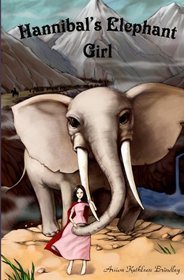 Hannibal's Elephant Girl by Ariion Kathleen Brindley– Liada is pulled from the river by the elephant Obolus, and adopted into a bustling military camp and all the traders who operate in it. She searches both for who she used to be, and who she wants to become, while getting to know the young man who will soon begin his famous march on Rome.
Hannibal's Elephant Girl by Ariion Kathleen Brindley– Liada is pulled from the river by the elephant Obolus, and adopted into a bustling military camp and all the traders who operate in it. She searches both for who she used to be, and who she wants to become, while getting to know the young man who will soon begin his famous march on Rome.
This one is a classic historical fiction middle grade novel, and one I think ought to win awards, but I don't know how much the author has managed to submit it to any contests, unfortunately. The characters and setting is vivid and reminded me of such Newberry winning historical classics as "Yung Fu of the Upper Yangtze" or "Daughter of the Mountains." The one thing I wanted more of, was more scenes with Obulus, the elephant, although I'm guessing the sequel has plenty of that. Unfortunately I haven't gotten to read it yet. I have read a couple of Brindley's other, adult novels though, and they're also excellent.
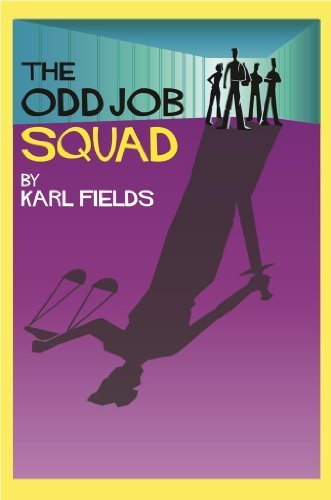 The Odd Job Squad by Karl Fields — Ander runs a middle school revenge business with his small group of quirky friends. They pride themselves on getting back at the school bullies without getting caught. But when they stumble into some adult secrets with large ramifications, they find themselves in deeper trouble than they ever imagined.
The Odd Job Squad by Karl Fields — Ander runs a middle school revenge business with his small group of quirky friends. They pride themselves on getting back at the school bullies without getting caught. But when they stumble into some adult secrets with large ramifications, they find themselves in deeper trouble than they ever imagined.
This one had me laughing the whole way through, yet also really caring about the characters. Like "Dairy of a Wimpy Kid" or the "Bad Girls" series, I felt totally immersed in the world of junior high school while reading. The setting in San Francisco is very vivid as well; I've only visited the city a couple times, but felt the novel really captured the sense of it. Also, plenty of plot twists and turns and a thought provoking commentary on what's appropriate and what's not trying to stand up to bullies.
 Bad Spelling by Marva Dasef – Katrina can't spell, a terrible problem for anyone, but made worse by the fact she's a witch. All her spells go wrong, no matter how hard she works, while her younger brother is extra talented. It's enough to drive any girl crazy. But when she sets out find the nature of the curse that hinders her magic, her brother turns out to also be her biggest supporter.
Bad Spelling by Marva Dasef – Katrina can't spell, a terrible problem for anyone, but made worse by the fact she's a witch. All her spells go wrong, no matter how hard she works, while her younger brother is extra talented. It's enough to drive any girl crazy. But when she sets out find the nature of the curse that hinders her magic, her brother turns out to also be her biggest supporter.
A lively mix of humor and sincerity, this adventure is one I critiqued from its first draft, and I'm thrilled that it finally got picked up by an e-publisher this year. The characters are dynamic and the sibling relationship my favorite part of this story. There's also some great plot twists and hilarious moments I don't want to spoil. And while this is my favorite of Marva's books, I've also helped critique and am a fan several other middle grade novels of hers, including "Eagle Quest," "The Tales of Abu Newas," and "First Duty."
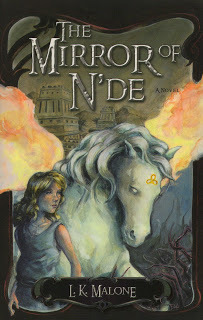 The Mirror of N'de by LK Malone — Hadlay, a gutsy child of an enslaved people, wins a chance to join the Emperor's elite magical school. She hopes by winning the prince's attention she can better her people's plight, yet swept away by competing desires for revenge and glory, finds herself wrapped up in court politics that go deeper than she could have ever imagined.
The Mirror of N'de by LK Malone — Hadlay, a gutsy child of an enslaved people, wins a chance to join the Emperor's elite magical school. She hopes by winning the prince's attention she can better her people's plight, yet swept away by competing desires for revenge and glory, finds herself wrapped up in court politics that go deeper than she could have ever imagined.
Think "Narnia" meets "Harry Potter" with a twist of horror, or at least in my mind when I consider how grim some of the spectacular twists in the story take it. (Then again, "Goosebumps" is my level of horror novels.) I would consider it a 12 and up novel, depending on how well the kids can take horror, but well worth the read. Part of it is the vivid quality of events that really bring the fantasy world presented here to life. Also, I don't mind a bit of allegory in a story, especially one with such strong plot and characters. It makes its theological points, but it's all within the framework of the story events.
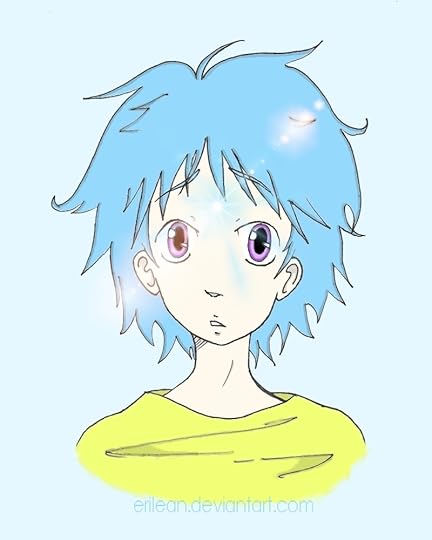 Hero's Choice by A. Merc Rustad – Dark Lord Mrkota discovers the newborn fated to kill him in fifteen years, conveniently marked with a blue star on his forehead. But flouting tradition, he decides to adult him instead of letting him float off downstream in a basket, because "I'd rather have my heir learn how to rule my empire the proper way if he's going to kill me and take over." Everyone else, however, seems bent on making fate come true, whatever Mrkota and his son might want.
Hero's Choice by A. Merc Rustad – Dark Lord Mrkota discovers the newborn fated to kill him in fifteen years, conveniently marked with a blue star on his forehead. But flouting tradition, he decides to adult him instead of letting him float off downstream in a basket, because "I'd rather have my heir learn how to rule my empire the proper way if he's going to kill me and take over." Everyone else, however, seems bent on making fate come true, whatever Mrkota and his son might want.
This is a wonderful young adult humor novella in the tradition of "Dealing with Dragons," only this time it's the villain who's taking a stand against fairy tale traditions. It's published with the young adult online magazine "Silver Blade," and currently FREE. If you haven't read it yet, go do it, while it's still available! Although I hope the author will put it up on kindle when the magazine is done with it, because this is one of my all time favorites.
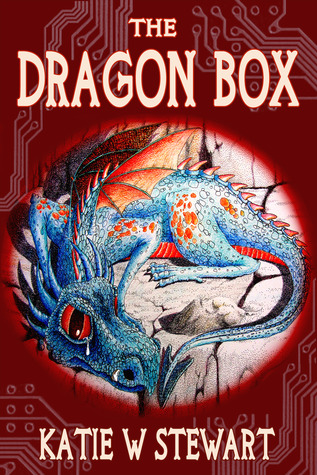 The Dragon Box by Katie W Stewart — James is drawn into another world by a small devise belonging to his quirky neighbor and has to work out his real world problems in a parallel fantasy world.
The Dragon Box by Katie W Stewart — James is drawn into another world by a small devise belonging to his quirky neighbor and has to work out his real world problems in a parallel fantasy world.
While I don't love this one as much as the author's forthcoming "The Mark of the Dragon Queen," it's a strong middle grade novel that will resonate with kids. The characters are dynamic and entertaining and the well worn themes are presented in a lively manner that's quite appealing. And who wouldn't fall in love with this cute little dragon?
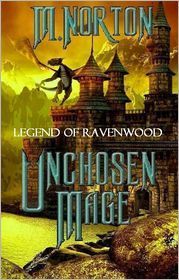 Unchosen Mage by M. Norton – A wizard locked in a Merlin-esque state of suspended animation might be the only hope for Lanterra as evil forces seek to destroy the world. Two young wizards in training, one the top of his class, the other the class dropout, are forced by events to go looking for a way to end the enchantment.
Unchosen Mage by M. Norton – A wizard locked in a Merlin-esque state of suspended animation might be the only hope for Lanterra as evil forces seek to destroy the world. Two young wizards in training, one the top of his class, the other the class dropout, are forced by events to go looking for a way to end the enchantment.
This classic high fantasy novel was one that I shredded early on it its life. Instead of ignore me of worse, being crushed, Marti gave me almost everything I asked for! And believe me, what I asked for was a complete rewriting of events. How awesome is that for an author? And one of the scenes I asked her for ended up being a trust fantastic scene, but since it involves the climax, I'm going to keep quiet about exactly how awesome it is. It's a young adult novel in the same vein as "Eragon," but with great friendship between the two main characters at its center that keeps it much more vivid as far as characterization.
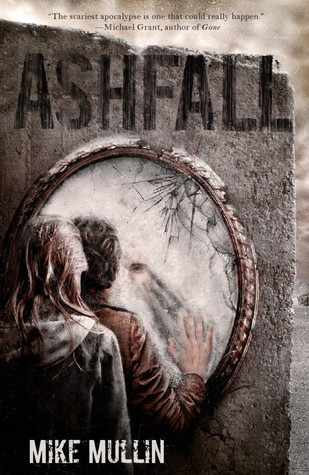 Ashfall by Mike Mullin — When a supervolcano at Yellowstone explodes, it sends a large section of the United States into chaos. Dark ash covers everything, blotting out sunlight, and things fall apart quickly. Alex, left home on the fateful afternoon by himself while his family went to visit relatives, journeys across the ash-covered landscape to attempt to reach them. It is a battle for survival.
Ashfall by Mike Mullin — When a supervolcano at Yellowstone explodes, it sends a large section of the United States into chaos. Dark ash covers everything, blotting out sunlight, and things fall apart quickly. Alex, left home on the fateful afternoon by himself while his family went to visit relatives, journeys across the ash-covered landscape to attempt to reach them. It is a battle for survival.
This gripping disaster novel kept me glued to it each time it went through the queue. It is on the more mature end of children's books for violence, language, sex, and the sorts of situations presented. Like "Lord of the Flies" we get some of the darker aspects of human nature, but for the right young adult (and adult readers like me), will have a lot of appeal.
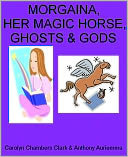 Morgaina, Her Magic Horse, Ghosts and Gods by Carolyn Chambers Clark — Morgaina has been languishing in an orphanage (that is driving everyone crazy with her pranks), until the ghost of her mother shows up to deck her out in full battle gear and send her off to Valhalla on her first quest. Turns out her mysterious father was a Norse god and quests are a family tradition.
Morgaina, Her Magic Horse, Ghosts and Gods by Carolyn Chambers Clark — Morgaina has been languishing in an orphanage (that is driving everyone crazy with her pranks), until the ghost of her mother shows up to deck her out in full battle gear and send her off to Valhalla on her first quest. Turns out her mysterious father was a Norse god and quests are a family tradition.
I'll admit the cover is awful, the title could be better (I liked the original one more), and it probably needs more copy editing than this poor book got, but this is a great story for the target audience of 9-12 year old girls. I laughed and smiled all the way through critiquing it, the characters are lively and fun, the setting whimsical, and honestly, the age group is pretty forgiving of bad cover art. So, while I'm hoping the author will hire an artist who can really make this shine, it's still a fun read. I'm always going to remember it fondly.
***
Also, in honor of the holiday season, I'm having a SALE on my own middle grade novel. From now until Christmas, "A School for Villains" is only 0.99 on Smashwords! So pick up a copy while it lasts!
December 1, 2011
What to do with a Novel Post November
So, I've made it, and I hope that most of you who have also been noveling this November have also made it or will shortly! Often I'm asked by people I get chatting with over Nanowrimo, what I do with my novel afterwards. I have a pretty set path for how I deal with it, actually.
1) Let the novel sit.
This step for me is critical. I've spent an intense burst of energy over it. Now I need some detachment from it and letting it sit for anywhere from a few weeks to several months can help me get a fresh view on it. How long a book needs to rest between drafting and editing depends on the project, but even if I'm hot to get revising on it, I let it sit at least a week or two.
2) Reread the whole novel and take notes.
When approaching revisions, it's good to get a sense of the whole picture, the big book issues, what got missed or needs changing, and so I reread the draft at a quick pace, looking for these bigger issues. From my notes on it, I create a revision outline.
3) Revise.
Once my revision outline is complete, I attack the novel for a first revision. My goal is at the end to have a novel that a person can read from beginning to end and enjoy, without any of those [name the city later] type notes in it.
4) Get critiques on the novel.
No matter how good I feel the book is, getting outside feedback is essential. Even with time letting the book sit, I'm too close to my work to be able to be the sole editor. Every novel should get not just one, but several outside opinions. In my mind, the more the better.
There's several good ways to get a novel critiqued. Unfortunately, the first two popular ones are the worst ways: asking friends or relatives and sending the book to agents/editors. Friends and relatives often don't share your same interests, tastes, and can be unreliable getting back to you on the novel. Bugging them stresses your relationships and you may not get a helpful or honest opinion either.
Agents and editors involve long waits and often brief form rejections. When they do give feedback it's often quite useful, but after only one revision a book is not ready for that and it's a waste of everyone's time.
In my mind, the best people to read and critique your novel are other writers in the same genre. I believe this for some very good reasons.
–as they are writers, they will share your same passion and drive about writing and making stories better
–as they are in your genre they will be interested in your novel and most helpful
–when all of you finally reach publication you have ready-made contacts within the industry
I've used critique groups for years and there's a wide variety of ways they work. Here's some basic categories and their pros and cons:
Real life Critique Groups
These are groups who meet periodically in real life. People either send each other the manuscripts ahead of time, or some of them take turns reading it aloud while meeting.
Pros: There's high accountability, you're meeting these people in real life, you'd better get your part done. There's also high energy, something very invigorating about connecting with people in person and a group can get wonderful brainstorms through talking about your work.
Cons: It can be difficult to fit everyone's schedules in such a way that you can all meet. Sometimes the number of local writers is small or most of the people you can find who are interested aren't in your genre. The word count of how much you can submit each round is also limited.
Email Critique Groups
These function the same as a real life group, but are all done in email. Usually there's a site that orchestrates making the groups by genre or interest, and then everyone is sent everyone else's email. They all run slightly different, either one person takes a turn getting critiqued each week, or perhaps everyone submits a chapter or short selection that everyone else crits within the group's period.
Pros: You can do crits on your own time without worrying about meeting up with people. It's easier to get a group in your particular genre.
Cons: It can take many months to get through a whole novel chapter by chapter with the word count limits most groups require to keep everyone's work load down. You don't get the real time energy that meeting up in person can create.
Whole Novel Exchanges by Email
This is a more unstructured way of doing things. You connect with some writers online and each mail the other person your novel in exchange for theirs. I usually do this with people I've known for a while on forums or in chat rooms, but sometimes may exchange with someone I just met if they're asking for partners.
Pros: Someone reads your entire novel in one go, getting a larger, whole book perspective. You can work at your own pace and time to do your critiquing back.
Cons: It can take a long time with no checks to keep everyone on track. Sometimes people forget to get back to you or life takes over. It's more critique intensive to read someone's novel back. You only get one opinion, not a group perspective. Some of them cost a fee to join.
Forum based Critique Workshops
These usually have an accountability system set in place. Either your story must wait in line until it rises to the top of the week's/month's selection, or some are point based, where you gather critique points by commenting on other people's stories/chapters that allow you to post your own.
Pros: A larger selection of people and genres/novels to critique or read from. Often there's a format to submit chapters one by one, and you can collect a fairly large group of readers, I've had 10-20 people following me on larger critique sites. You get a wide range of opinions.
Cons: It can take a long while to put a whole novel through. Some people may critique inconsistently or only part of your novel. Some of the sites require fees to join or have full use of the site. Some require consistent participation to stay a member.
Paid Creative Writing Classes/Workshops
These usually cost money to do, so I've never tried one. But I can imagine that you do get what you pay for, both group critiques and an instructor who helps you with your novel. There's some online as well, and I know some people are very happy with the instruction and interaction. I've found the free systems have worked well enough for me so far, but if you have the money and interest, there's no reason this couldn't be quite beneficial. I met someone who took a writing/revising series of classes and went on to get an agent and become a NYT best seller. She credits the class for getting her there.
Whichever for of critique you chose, I have personally found the process of giving and receiving critiques invaluable.
November 26, 2011
"A School for Villains" gets a review
The holidays may have been super busy, but I'm excited to announce I'm up at a couple of other sites this weekend. Exciting times!
I got my first review today for "A School for Villains" on Nayu's Reading Corner. I'm ecstatic about her 10/10 rating!
Also, I am featured in a guest post about "Chosen Sister" discussing sibling rivalry and how it inspired me to write the book on Someone Else's Kids.
Then, "Chosen Sister" print edition has also finally come up on Amazon. It's the same price there ($9.99) as on Create Space. The advantage for Amazon is, all the reviews on the e-book came across for the print. I haven't seen a place to put reviews up on Create Space's site, the only advantage it gives me is a slightly larger royalty.
Also, been poking away at the Nanowrimo… just broke 46,000 words. I'm aiming to win on Monday, which will give me a little more time to prepare for attending a Create Space book pitch workshop I'm signed up for on December 7th. I'm excited to have been chosen for it, although I'm unsure still which book I'm going to get feedback on the pitch for! I go back and forth between both published novels and whether I'd rather attempt one of the unpublished ones. So, I need all the time I can get to prepare for it.
That and I'd like to get the books out to some more blog review sites to get the word out.
November 21, 2011
Going for Print
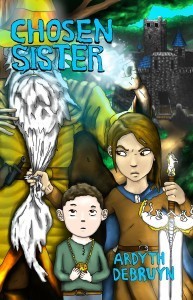 I've been debating if it's worth making POD copies of my novels available. According to my contract, after "Chosen Sister" has been out a year (it's been out 2 years) I have that option. At first I didn't think it was worth it, but over the past year I've re-evaluated the circumstances. For one thing, lots of children still read middle grade novels in print. Also, book fairs and other real life events support print copies better than e-books. I'd enjoy trying to create some local events, or perhaps read to children in schools, even if I'm not sure how to set these things up.
I've been debating if it's worth making POD copies of my novels available. According to my contract, after "Chosen Sister" has been out a year (it's been out 2 years) I have that option. At first I didn't think it was worth it, but over the past year I've re-evaluated the circumstances. For one thing, lots of children still read middle grade novels in print. Also, book fairs and other real life events support print copies better than e-books. I'd enjoy trying to create some local events, or perhaps read to children in schools, even if I'm not sure how to set these things up.
So, the last couple of months I've taught myself how to format a book for print, something very different than making an e-book, hired a cover artist (I can't use my publisher's cover and reviewers wants something more middle-grade themed anyway), and got cracking on making print copies. I learned when I finally held the proof copy in my hands, that it actually does mean something different to my old fashioned mind to hold a paperback book, then to have a pdf on my computer screen. Wow it felt good. It makes me really glad I did this.
I'm also in love with JP's cover for the book. It captures the humorous tone of the book perfectly and suggests the reader age is 9-12, which is really the best audience for this novel. Today I finished up looking it over and "Chosen Sister" is now available at Create Space for $9.99 in print. In a few weeks it will come available on Amazon and other distribution sites. I'll make an announcement when those go through.
Now I just have to get "A School for Villains" finished up in the print edition and I'll be set to crash some book fairs and farmer's markets locally! Until then though, there's e-copies available at Amazon, B&N, and Smashwords.
Also, once I get all the site up-dated, I'll get a non-advertising blog post up this week as well.
November 16, 2011
A Break from Writing for Dreaming
 One thing I always notice during Nanowrimo is how much energy getting out the word count takes out of me and how much more time I spend intently staring at the computer screen. While it's not as hard on my eyes as say an 8 hour marathon of spider solitaire or minesweeper, it does rather exhaust both my eyes and my brain to add that much more screen time.
One thing I always notice during Nanowrimo is how much energy getting out the word count takes out of me and how much more time I spend intently staring at the computer screen. While it's not as hard on my eyes as say an 8 hour marathon of spider solitaire or minesweeper, it does rather exhaust both my eyes and my brain to add that much more screen time.
This makes it more critical to take proper breaks and do non-writing activities that are both restorative and creative. My usual choice for non-writing creativity is wychinanki, or Polish Papercutting, where layers of colored paper are cut into the shape of birds or flowers with colored paper on top in diminishing sizes. However, living with relatives (gotta love the recession) doesn't give me a permanent table for the cutting and gluing and has scattered my supplies. Thus, I decided my non-writing activity would be cleaning my room and sorting through the clutter to find my stuff. Joy. But it moved my hands and rested my eyes and used a different part of my brain than novel writing does, so that was good enough to qualify.
Well, while cleaning I found a dreamcatcher kit that my aunt had given my husband for Christmas several years ago and he'd never bothered with. I've
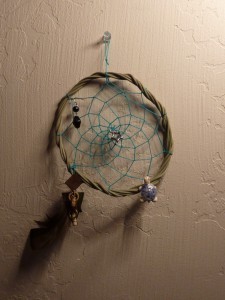 always thought dreamcatchers were really cool, but none of the people I knew who made them ever got around to make me one, and let's face it, when spending money, it was never going to get up to the top of my list as far as actually buying one. So, I got excited, and thought I'd try and make the dreamcatcher following the kit instructions. It was an interesting process but I've ended up really pleased with my dreamcatchers and quite pleased to finally have some to hang up.
always thought dreamcatchers were really cool, but none of the people I knew who made them ever got around to make me one, and let's face it, when spending money, it was never going to get up to the top of my list as far as actually buying one. So, I got excited, and thought I'd try and make the dreamcatcher following the kit instructions. It was an interesting process but I've ended up really pleased with my dreamcatchers and quite pleased to finally have some to hang up.
After soaking the reed and starting to bend it, I realized the instructions actually suggested making three smaller ones instead of one big one, so I switched to trying that and made three hoops out of the colored reed. I was a bit clumsy, but liked the results anyway. I started with the blue hoop, and decided to use the blue string in the kit for it, but while there were feathers, the beads and a small clay bird, supposedly in the kit, were missing. So I hunted around in some of the old jewelry I had and picked the star and the turtle for the blue dreamcatcher, along with a couple of old earrings. After all, a turtle is as good as a bird for a symbolic dream symbol, right?
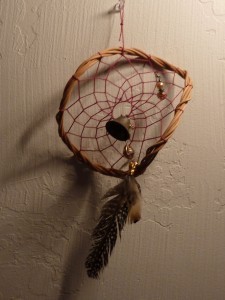 The red one, I found that I hadn't made the hoop as well, and the tension started to warp it. After determining this was inevitable without resoaking it and trying to shape it to be smaller and stronger, I decided just to go with as the warped shape was also sort of pretty. Again, I used a couple of old earrings for beads and while I've never seen a bell on a dreamcatcher, this one lying around seemed like the perfect thing to add to it. To conserve feathers as the kit was short, this is one I found in my driveway that I think was once a feathered earring, but ended up in the mud and so is a little worse for wear, but the rugged shape I think worked out despite that.
The red one, I found that I hadn't made the hoop as well, and the tension started to warp it. After determining this was inevitable without resoaking it and trying to shape it to be smaller and stronger, I decided just to go with as the warped shape was also sort of pretty. Again, I used a couple of old earrings for beads and while I've never seen a bell on a dreamcatcher, this one lying around seemed like the perfect thing to add to it. To conserve feathers as the kit was short, this is one I found in my driveway that I think was once a feathered earring, but ended up in the mud and so is a little worse for wear, but the rugged shape I think worked out despite that.
The final one (purple) I hoped to keep from warping by not pulling it as tight, but it did a little, although not into as dramatically as the red one. I decided to go all out on this one as far as trying to weave things in. The stone and cross I got from one of those little machines at the supermarket (see my previous post and ninjas and aliens for the little machine saga) and thought they would be the perfect elements for this. The shell I found on the beach last year. The beads are old earrings and I just stuffed the ends of the feathers into the beads and figure if I'm careful, it'll stay together. Over all, I love these. It was worth the wait for the right dreamcatchers.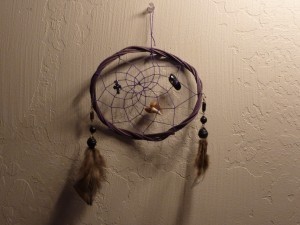
November 7, 2011
What makes a book ready to write?
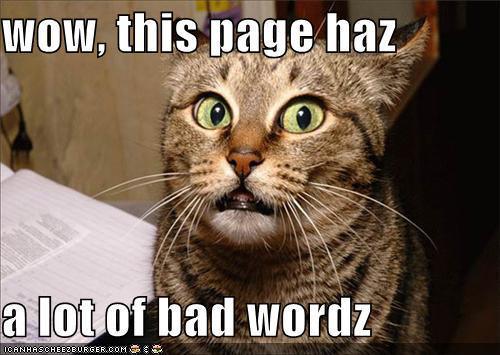 It's been an interesting first week of Nanowrimo for me. One reason I didn't make a blog post last week, because between getting "A School for Villains" out on Amazon and starting my novel, I was too overloaded. However, three days in, I got stuck. That's happened before but not quite this way, or with quite this result.
It's been an interesting first week of Nanowrimo for me. One reason I didn't make a blog post last week, because between getting "A School for Villains" out on Amazon and starting my novel, I was too overloaded. However, three days in, I got stuck. That's happened before but not quite this way, or with quite this result.
See, I spent a lot more time outlining the book than I have in the past, partly to prevent getting stuck, but despite that, I was hitting a wall that seemed more about a lack of getting into the character's heads properly or the spirit of the world. Because the work was connected with my new release I found the stress was too high, and ended up realizing the book just wasn't ready to be written for several reasons. I set aside the project at my husband's suggestion, set my word count to zero, and started another novel instead. While I'm still tragically behind, the book is far easier to write despite no planning at all.
This has gotten me pondering when a novel is ready to be written. You would think after having drafted twelve novels in full and publishing two of them I'd already have an idea of when new idea is ready to be written, but this year's progress (and the first time I've ditched all my word count instead of sticking it out) has made me realize I actually don't know the perfect magic that means some books get written and others get stalled.
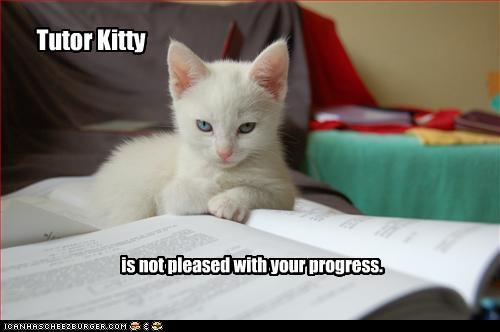
See, those twelve novels have at least that many or more that got started and never finished. I'm just one of those disgustingly prolific writers and to be fair I've done this over eight years, so it was a rather long period of time. So, I thought I'd do a bit of self examination and try to figure out what makes a book ready to write for me.
The problem is, it doesn't seem consistent.
My first novel took five years to write (not counted in my tally for the other novels) and that was understandable. I was learning the craft. That also gave me plenty of time to ruminate on other ideas because I'd vowed not to start a new project until I'd finally finished the book. It was my way of making myself finish something. So, when I made myself finish in time for Nanowrimo, it didn't surprise me that the idea I picked for my second novel was easy to write, it'd been sitting in my head for 5 years. The same with the third book I finished, a sequel. It'd had a long incubation period.
But then, the next two Nanowrimos I picked brand new ideas instead of the ones that had been sitting around in my head. They just insisted they were more interesting and so despite being new and unplanned I went for them. I wrote two very tight and well-plotted novels with them, one of which was my first published book. In both cases I had a strong premise and a concrete climax and little else, yet they flowed easily. Meanwhile better plotted and researched projects languished.
Thinking that perhaps an idea being new and energetic was the answer, I tried just going with it and discovered over the following few years it didn't work reliably. I had a lot of false starts and painfully long battles to finish a number of following novels. I had about three Nanowrimos in a row that the final product was basically unfinished and unreadable and the only progress on finishing novels that I made was on slower written projects during the rest of the year. It made me feel like being better researched and plotted would help the novels come out better. Thus my attempt to prepare better this year.
And yet here I find that my well plotted and researched project wasn't ready, while an idea I've had kicking around in my head that's indistinct and vague seems to be ready to go. Apparently I'm not very good at knowing myself. My only consolation is that this time I realized what was wrong was I didn't feel ready to write the book and that I was better off setting it aside and writing something else than getting a mangled draft out of all my work like in some of
This leads me to think that perhaps the only way for me to know if a book is ready to be written is to try it and see if it flows or if it flops.



